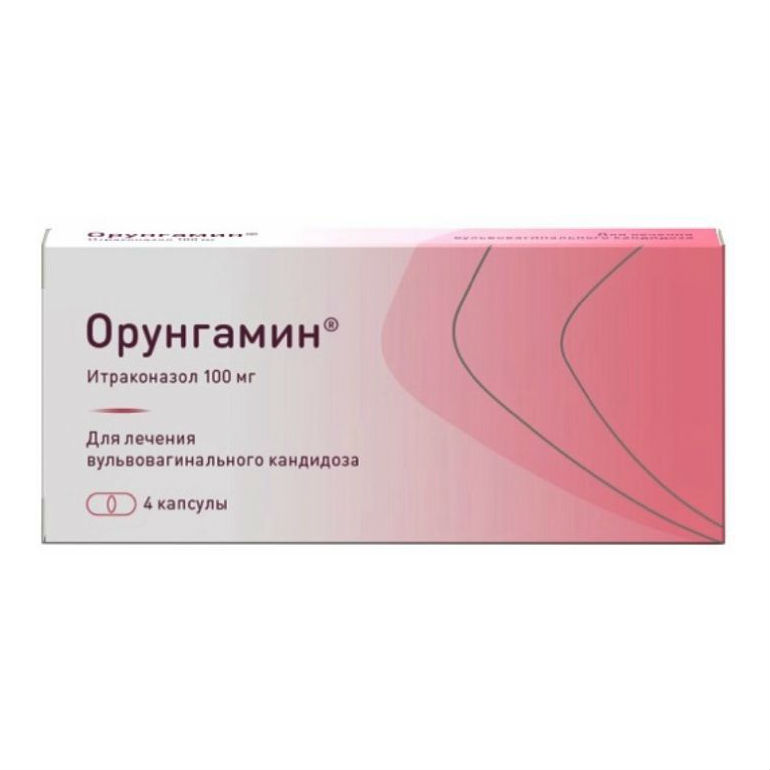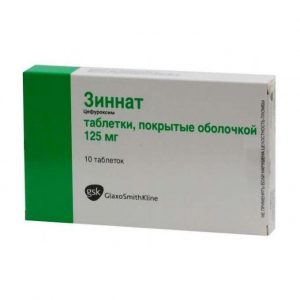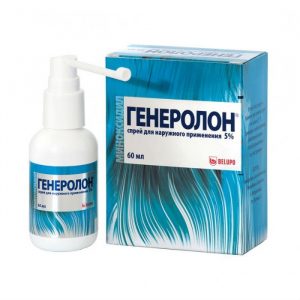Description
Pharmacological action
Itraconazole is a synthetic broad-spectrum antifungal agent derived from triazole. It inhibits the synthesis of ergosterol in the cell membrane of fungi, which leads to the antifungal effect of the drug.
Itraconazole is active against:
dermatophytes (Trichophyton spp, Microsporum spp, Epidermophyton floccosum),
yeast Candida spp. (including Candida albicans, Candida parapsilosis),
of mold fungi (Cryptococcus neoformans, Aspergillus spp., Trichosporon spp., Geotrichum spp., Penicillium mameffei, Pseudallescheria boydii, Histoplasma spp., Coccidociociociocides braces iochemidocidaidesmides , Cladosporium spp., Blastomyces dermatidis), Malassezia spp ..
Some strains may be resistant to itraconazole: C. glabrata, C. krusei, C. tropicalis, Absidia spp., Fusarium spp., Mucor spp., Rhizomucor spp .. Rhizopus spp., Scedosporium proliferans, Scular spp .. The effectiveness of treatment is evaluated after 2-4 weeks. after discontinuation of therapy (with systemic mycoses), after 6-9 months. – with onychomycosis (as the nails change).
Indications
skin and mucous membrane lesions:
dermatomycosis
vulvovaginal candidiasis
versicolor versicolor,
oral mucosa candidiasis keratomycosis
deep visceral candidiasis.
onychomycosis caused by dermatophytes and / or yeast and molds:
systemic mycoses:
systemic aspergillosis and candidiasis
cryptococcosis (including cryptococcal meningitis): in patients with immunodeficiency and in all patients, it is only necessary to have cryptosis cases if first-line drugs are not applicable in this case or
histoplasmosis
sporotrichosis
paracoccidioidosis
blastomycosis
other rare systemic mycoses are not effective.
Contraindications
1. Hypersensitivity.
2. Chronic heart failure, including history (with the exception of therapy for life-threatening conditions).
3. Simultaneous administration of the following drugs:
drugs metabolized by the CYP3A4 isoenzyme that can lengthen the QT interval (astemizole, bepridil, cisapride, dofetilide, levacetylmethadol, misolastine, pimozide, quinidine, sertindole s-indifferents) CYP3A4 isoenzyme (simvastatin, lovastatin)
oral administration of triazolam and midazolam
ergot alkaloids (dihydroergotamine, ergometrine, ergotamine and methylergometrine)
nisoldipine, eletriptan.
4.Children under 3 years old.
5. Fructose intolerance, sucrose / isomaltase deficiency, glucose-galactose malabsorption.
CAUTION – renal / hepatic insufficiency, peripheral neuropathy, risk factors for chronic heart failure (coronary heart disease, damage to heart valves, severe lung diseases, including chronic obstructive pulmonary disease, conditions accompanied by edema syndrome), hearing impairment, simultaneous use of blockers of “slow” calcium channels, children and the elderly.
Special instructions
To prevent reinfection, simultaneous treatment of sexual partners and personal hygiene are necessary. During treatment, it is recommended to refrain from sexual intercourse. If signs of infection persist after treatment is completed, a repeated microbiological examination should be performed to confirm the diagnosis.
The efficacy of itraconazole for the treatment of fungal infections in severe neutropenia is unknown, therefore, in such cases, the drug should be used only if the 1st line of therapy is ineffective.
In case of risk factors for chronic heart failure (coronary heart disease, damage to the heart valves, severe lung disease, including chronic obstructive pulmonary disease, conditions accompanied by edematous syndrome) during treatment with itraconazole, therapy should be discontinued.
When taking itraconazole in some patients, transient and permanent deafness was noted.
1 capsule of Orungamine contains 4 bread units (XE).
IMPACT ON THE ABILITY TO DRIVE A CAR AND WORK WITH APPLIANCES
Does not affect the ability to drive and operate machinery.
Composition
For 1 capsule:
Active ingredients: itraconazole 100 mg,
Excipients: hypromellose (hydroxypropyl methylcellulose E-5), butyl methacrylate, dimethylaminoethyl methacrylate and methyl methacrylate (1-sugar, 1-copolymer) sugar)).
Composition of capsules: case: gelatin cap: dye indigo carmine, titanium dioxide, gelatin.
Dosage and administration of
Take itraconazole by mouth immediately after a meal. Capsules should be swallowed whole.
Indication Dose Duration
Vulvovaginal candidiasis 200 mg 2 times a day or 200 mg 1 time per day 1 day or 3 days
Multi-colored lichen 200 mg 1 time per day 7 days
Dermatomycosis smooth skin 200 mg 1 time per day or 100 mg 1 once a day 7 days or 15 days
Lesions of highly keratinized areas of the skin, such as hands and feet 200 mg 2 times a day or 100 mg 1 time per day 7 days or 30 days
Candidiasis of the oral mucosa 100 mg 1 time per day 15 days
Fungal keratitis 200 mg once a day 21 days
Correction possible duration of treatment with the positive dynamics of clinical candidiasis
When oral mucosa bioavailability of drug when taken orally, can be reduced in some patients with impaired immunity, for example, patients with neutropenia, AIDS patients, or patients with transplanted organs. In these cases, a double dose increase may be required.
Itraconazole is excreted from the skin and nail tissue more slowly than from plasma. Thus, the optimal clinical and mycological effect is achieved 2 4 weeks after the end of treatment for skin diseases and 6 9 months after the end of treatment for nail diseases.
Side effects of
From the hemopoietic organs: leukopenia, neutropenia, thrombocytopenia.
Allergic reactions: serum sickness, angioedema, anaphylactic and anaphylactoid reactions, hypersensitivity.
From the skin: toxic epidermal necrolysis, Stevens-Johnson syndrome, erythema multiforme, exfoliative dermatitis, leukoclastic vasculitis, alopecia, photosensitivity, urticaria, rash, itching.
From the side of metabolism: hypertriglyceridemia, hypokalemia.
From the nervous system: peripheral neuropathy, paresthesia, hypesthesia, dizziness.
From the organs of vision and hearing: visual impairment, including vagueness and diplopia, tinnitus, transient or permanent deafness.
From the cardiovascular system: congestive heart failure.
From the respiratory system: pulmonary edema.
From the digestive system: abdominal pain, vomiting, nausea, diarrhea, impaired taste, increased activity of ² Ñliver ² Ñ enzymes dyspepsia, constipation, hepatitis, hyperbilirubinemia, hepatotoxicity, acute liver failure.
From the musculoskeletal system: myalgia, arthralgia.
From the genitourinary system: pollakiuria, urinary incontinence, menstrual irregularities, erectile dysfunction.
Other: edema.
Overdose
No data. In case of accidental overdose during the first hour after taking the drug, gastric lavage should be carried out, activated charcoal should be taken.
Symptomatic treatment. Hemodialysis is not effective. There is no specific antidote.
Storage conditions
Store in a dry, dark place at a temperature of no higher than 25 ° C. Keep out of the reach of children.
Expiration
3 years. Do not use after expiration date.
Active substance
Itraconazole
Terms and conditions
prescription
Dosage form
capsules




